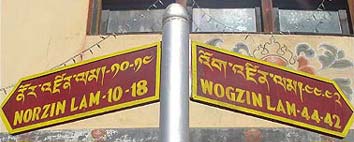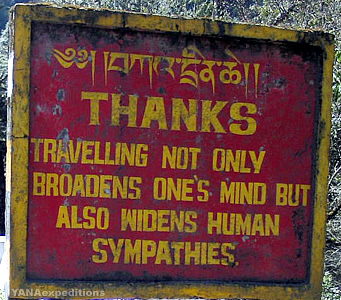|
Dzongkha:
Bhutan's national language
|
 |
Bhutan's
Culture: Dzongkha |
|
 |
Bhutan Information |
|
|
 |
|
Dzongkha
: Why it is not taken seriously
|
 |
"The
future of the national language, Dzongkha, looks rather bleak. As more
people trickle into urban Bhutan and as the number of wealthier, better
educated and cosmopolitan Bhutanese increases, Dzongkha is forced to a
retreat. People investigated said that Dzongkha "is under severe risk of
being discarded. |
The
status of the national language today is nothing to write home about,"
said Chencho, a Dzongkha writer and translator. "It is losing out to foreign
languages, especially English. The government has adopted many innovative
initiatives and activities to develop and promote dzongkha, and in that
sense Dzongkha has progressed. But in terms of popularity, it has not gained
much," said the editor of Kuensel's Dzongkha edition, Mindu Dorji.
Many
people pointed out that the foremost undermining factor against Dzongkha
is "its lack of utility". "Students learn Dzongkha "just to pass',"
said a parent. "When I question my children about their low grades in Dzongkha,
they tell me that being or not being proficient in Dzongkha will hardly
matter. They say, "what use will it have if I decide to become a doctor?'"
"The reason why students, or for that matter any Bhutanese, do not take
Dzongkha too seriously is because one can get by without it," an engineer
told. "In fact, it is perceived that one will be better off." Dzongkha's
increasing unpopularity is also attributed to the fact that it is not "practically
applied".
 |
A
former clerk, who now sells vegetables, said: "I may be an expert in Dzongkha
but if I have to wait for ages at the bank for an acquaintance to show
up and fill my withdrawal form, it makes me wonder whether learning dzongkha
serves any purpose at all." The Dzongkha literary editor of Kuensel,
Goembo Dorji, said that while Dzongkha may be the national language, it
is still not the official language. "If an application or note to an official
is written in English, it will be quickly attended. If it is written in
Dzongkha, it will probably be lost or misplaced."
Another
major reason for Dzongkha's unpopularity is said to be its difficulty.
In fact, some describe it as "the scholar's and not the commoner's language".
"As long as it remains difficult and complicated, Dzongkha will never become
popular," said a civil servant, who added that he has not "mastered" Dzongkha
"even after 16 hard years of speaking and learning it". |
|
Experts
however dispute such a claim. "No language is meant for scholars," said
Pema Wangdi at the Australian National University, the first Bhutanese
studying "descriptive linguistics". He said that Dzongkha, over the years,
has actually been made "easy and lucid" by scholars. "If Dzongkha
remains complicated, it isbecause people do not show interest in learning
it, supposedly because of the psychological fear that it is difficult."
Dzongkha, he said, will become the language for the commoner only if people
try to eliminate the psychological fear or combatthe "dzongkha phobia".
There
are people who say that it is not psychological fear but another "determinant
factor" that is undoing Dzongkha. "It is the attitude problem," Dorji,
who has been teaching Dzongkha for over two decades, told. According to
him, the upper class Bhutanese viewed Dzongkha with an unexpressed and
subtle disdain. "You will notice that students who are very weak in Dzongkha
are often those who come from affluent English-speaking homes."
Others
point out to the curriculum flaws in the education system as one of the
causes of the falling popularity of Dzongkha. "In schools the subject,
number of periods, and teachers for Dzongkha are limited," said Mindu Dorji.
"Students also say that the textbooks are dull, difficult, and uninteresting."
Many students in the capital in fact listed Dzongkha as their "least interesting"
subject.
On
the contrary, English was the "favourite" subject for many. Pema Wangdi,
however, feels that the cause of Dzongkha is not lost. Dzongkha, in his
view, has regained its status as the national language. It is presently
under the process of "vernacularisation". "Grammars have been written.
The media has adopted it and teaching and learning materials have been
developed," he said. All these are progressive developments. He feels that
it is "too early to expect solutions to language problems" in a short span
of time. "If Dzongkha is not attractive, it is because language planning
is relatively new to our system," he said. "Language has to evolve and
it may take centuries before it becomes attractive to all speakers and
non-speakers."
top
|
National
language: Book may help Dzongkha development
|
A
new guide book on report and letter writing, written by Namgay Wangchuk,
would not only help standardise the day-to-day official correspondence
but is yet another significant contribution to Dzongkha literature.
A lecturer at the royal institute of management (RIM), Namgay Wangchuk's
guide book comes at a time when the government is stressing the use of
Dzongkha in official communication.
The
government has directed that the national language should be used in official
meetings within the country and for all correspondences including appointment
orders, transfer orders, promotion orders, and circulars. Even store registers
and personal files are to be maintained in Dzongkha. According to
the author, the idea of writing the book came when he found that the traditional
style of correspondence was deteriorating.
The
book contains, among others, the guidelines on how to write reports, note
sheets, circulars, letters, and applications. Written in simple Dzongkha
with examples, the book would be especially useful to first time users.
It is available in the market at Nu 205 a copy. Publications of literature
in Dzongkha have been identified as crucial to promoting the national language.
Besides textbooks, an increasing number of comics, books on grammar, short
stories, dictionaries, lozeys, song books and namthars have been written
in recent years.
Meanwhile,
the editorial board comprising of experts in Dzongkha and English is continuing
discussion on Bhutan's first comprehensive Dzongkha-English dictionary.
The dzongkha development commission is planning to publish and release
the new dictionary in 2002. But the publication would be "provisional"
and subject to further discussions and changes as per the feedback from
readers.
| Information on Bhutan |
 |
| Links |
 |
 |
 |
External
Links |
|





